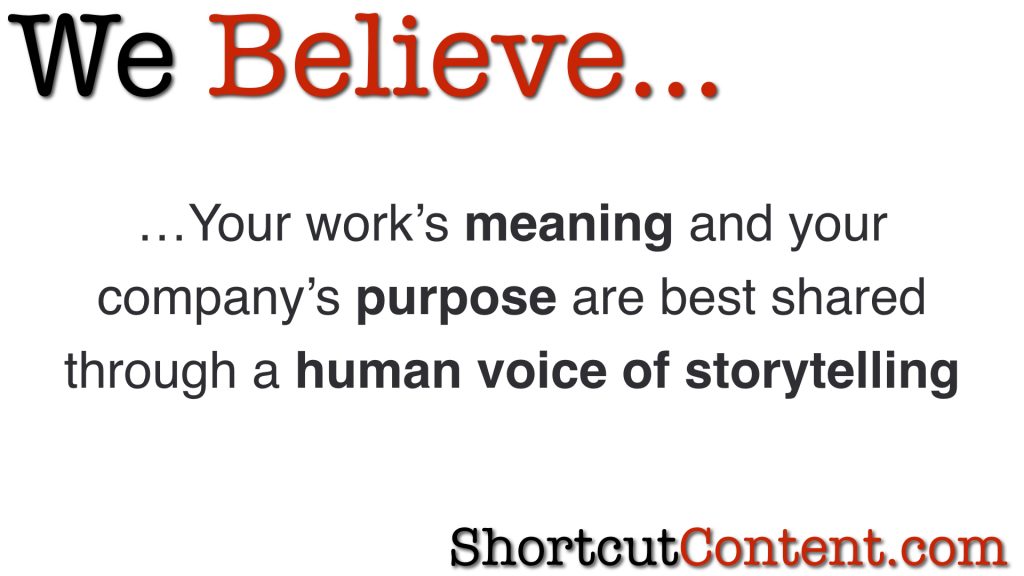Creed: Your Work’s Meaning is Best Shared Through a Human Voice of Storytelling

People buy from people they know, like and trust. In our day-to-day interactions, when we buy things we’re going to use in our life, we’re going to go to somebody that we know, somebody that we like and somebody that we trust. That’s how we choose a doctor, that’s how we’ll choose a lawyer, and if we don’t know one, we’ll ask somebody else who they know, who they like or who they trust. That’s why the second bullet point in Shortcut Content’s Content Creator’s Creed is that ‘your work’s meaning and your company’s purpose are best shared through a human voice of storytelling.’
It’s never going to be, ‘well, I’m going to choose that company because I really like their logo.’ If we have heard their story in a human voice and have heard what they can do to help us, they’ve got a better shot at getting us to pick up the phone or come in the door. What we do at Shortcut Content in podcasting, blogging, and video can help people get to feel like they know you.
I’ll use one our clients as a good example. He’s a chiropractor and he’s been doing these podcasts with us for about three years now and he said it happens every week. He’ll walk into the exam room and meet them for the very first time, and as soon as he opens his mouth, their reaction is, ‘I feel like I know you!’ What a great advantage to have the minute you walk in the door. You’ve got people that feel like they know you and like you and trust you, as opposed to building that with somebody that you’ve never spoken to. That’s a really powerful thing.
I used to be in the radio business and one of the biggest mistakes that a radio announcer can make is taking the viewpoint that they’re speaking to a big audience of people. It’s not going to come across as real as it would if, in their mind, they just thought about speaking to one person. So my advice to beginning announcers is always when that microphone comes on and you start to talk into it, make sure that you’re talking as if you’re speaking to one person sitting across the breakfast table, having a cup of coffee.
When you’re listening to the radio and the announcer is delivering information in that manner, your empathy is activated and, in your mind, you become a part of that conversation. And that’s what I think is really cool about listening to podcasts; we can feel like we’re actually a part of it. We might not be actively participating, but we’re sitting at our chair, at the same table, enjoying that same conversation and our empathy is activated.
Now, of course, we take the podcast audio and we rewrite it as written content for our clients’ websites, which is just another way for people to enjoy that same story. They just prefer to read it or that’s the way it fits into their lifestyle. So it’s a good way to create lots of different kinds of content.
When we are advertising or talking about a business, the most important question that you can answer is “Why should I care?” The “why” is the most crucial part of your story-telling and I’m going to get a little bit more into that in some of my next blog posts. Why should you care about Shortcut Content? I’m excited to answer that question. If you have questions before then, you can contact me several different ways by going to ShortcutContent.com. I look forward to speaking with you.
I’ve written a post about each line of the Creed. If you’d like to see them, just click on the links below:
We believe…
…the best content comes from individuals rather than organizations
…your work’s meaning and your company’s purpose are best shared through a human voice of storytelling
…communication derived from story transcends communication derived from product features
…readers deserve first-hand stories from experienced experts
…stories are best shared by experts who have lived to tell the tale rather than vicariously through writers and researchers
…the strength of your company rests in the personalities of your leaders
…sharing your wisdom through story is your best legacy
And the BEST way to write your story is whatever method gets the job done.